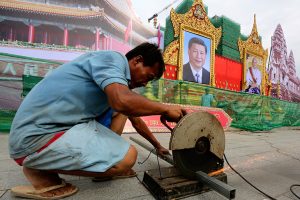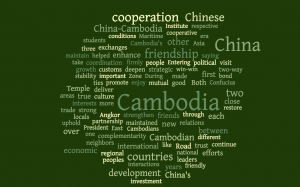Comments: According to news outlets and Cambodian netizens, the official visit of President Xi Jinping during this 13 October 2016 has triggered different opinions and reactions. According to Pseng Pseng by Ung B.A blogs titling “Hun Sen serves two masters well“, disclosing sensitive troops mobilizing of Vietnamese government into Cambodia soil at least during two critical events: during the clash between Cambodia and Thailand, and the election result in 2013 possibly leading to the loss of power of Hun Sen. If the news of this direct receiving from inner circle is relevant, it is also not unusual for intelligence from both USA and China, but the international relations means too much on how they can absorb interests for their nations, not the movements inside that nation, and they has always closed eyes not to see someone is raping Cambodia or enjoying with the raping moment indisputably. For Cambodia as a victim by such brutal raping, only dictatorship leader(s) and self-interest passionate individual(s), could ignore or neglect this raping action. During Xi’s visit, researchers and analysts have predicted its momentum by China’s firm policy to gain support from Cambodia’s stance on 1. China’s one state policy, 2. China’s approach to bilateral solution on Spratley dispute, and 3. lucrative natural resources investments in Cambodia. Xi shall observe from his own eyes on Cambodia’s genuine attitude towards China and power base of Hun Sen leadership. For this visit, CNRP must play its vital role to adjudicate and articulate its leadership and disclosing long term policy so that this party can negotiate and draw support from Xi Jinping. Pragmatically, Xi’s visit this time is to ascertain that his view on Cambodian people’s mindset has already shied away from his former patron or not?
China and Cambodia: Good Neighbors and Trusted Friends
President of the People’s Republic of China
At the invitation of King Norodom Sihamoni, I will pay a state visit to the Kingdom of Cambodia. This will be my first visit to Cambodia as the President of China, a visit I look forward to with great anticipation.

Many Cambodians expect the landmark visit will further deepen all-round cooperation between the two countries. Courtesy: sea-globe.com
Cambodia, an important link on the ancient Maritime Silk Road, is renowned for its rich history and the unique Khmer culture. The Angkor Wat, with its magnificent architecture and stunning bas-reliefs, stands as a true tribute to the talent of the Cambodian people and shines in the annals of human civilization. Entering the 21st century, Cambodia has made much progress in development and delivered a better life to its people. It is heading towards a promising future.
China and Cambodia are geographically and culturally close to each other, and our friendly exchanges trace back to more than a millennium ago. Through the ancient Maritime Silk Road, Chinese porcelain and lacquer wares were brought to Cambodia, and Cambodian spices and yellow wax stones were sent to China. The bas-reliefs of the Bayon Temple vividly depict the scenes of Chinese merchants trading with the locals in Cambodia. During China’s Southern and Northern Dynasties in the fifth and sixth centuries, Sanghapãla, Mandrasena and Subhūti, three eminent Cambodian monks, came to disseminate Buddhism in China. In China’s Yuan Dynasty, Zhou Daguan, a Chinese envoy, visited Cambodia. He later wrote The Customs of Cambodia, giving a vivid account of the local customs in Angkor and the friendly interactions between Chinese and Cambodians. Zheng He, the famous navigator of China’s Ming Dynasty, made numerous stopovers in Cambodia on his voyages. He described Cambodia as a land with warm climate and fertile fields where the locals boiled seawater to make salt and had colorful customs. The Sam Po Kong Temple in the suburb of Kampong Cham that honors Zheng He, still has many visitors today, testifying to the time-honored friendship between the Chinese and Cambodians.
A Cambodian proverb likens trust to the growth of a tree. The traditional China-Cambodia friendship, tested by times and changing international landscape, has grown strong like a luxuriant tree thanks to efforts made by past leaders of both countries. In 1958, China and Cambodia established diplomatic ties, opening a new chapter in their bilateral relations. Over the past 58 years, successive leaders of both countries have maintained close interactions and developed a close bond of friendship. King Father Sihanouk once fondly said that China-Cambodia friendship is like a flower that never withers and will always blossom under the bright sky. His words aptly depict China-Cambodia friendship.
Entering the new era, China-Cambodia friendship has continued to flourish, beaming with new vitality. Our two countries enjoy deep political mutual trust and win-win economic cooperation. We have

carried out fruitful cooperation in various areas, and maintained close consultation and coordination in international and regional affairs, setting an example of how two countries should treat each other as equals and cooperate with all sincerity.
In 2010, China and Cambodia established comprehensive strategic cooperative partnership, ushering their ties into a new era. We share similar development philosophy, and we agree to enhance complementarity between China’s “Belt and Road” initiative and Cambodia’s “Rectangular Strategy”. Two-way trade and investment have maintained strong growth in recent years. China has been Cambodia’s biggest trading partner and source of investment for three years. The year of 2015 saw our two-way trade topping US$4.4 billion.

 period. As a reminding, Cambodian Buddhists who are offering foods to Bhikkhu monks aiming to dedicate merits to those passed away ancestors, should reflect on themselves on how they are living with those blessing such as “may they be happy, and end of suffering”. By such self-reflection, the Cambodian people will see their own livelihood and uncontested sufferings in present society.
period. As a reminding, Cambodian Buddhists who are offering foods to Bhikkhu monks aiming to dedicate merits to those passed away ancestors, should reflect on themselves on how they are living with those blessing such as “may they be happy, and end of suffering”. By such self-reflection, the Cambodian people will see their own livelihood and uncontested sufferings in present society.